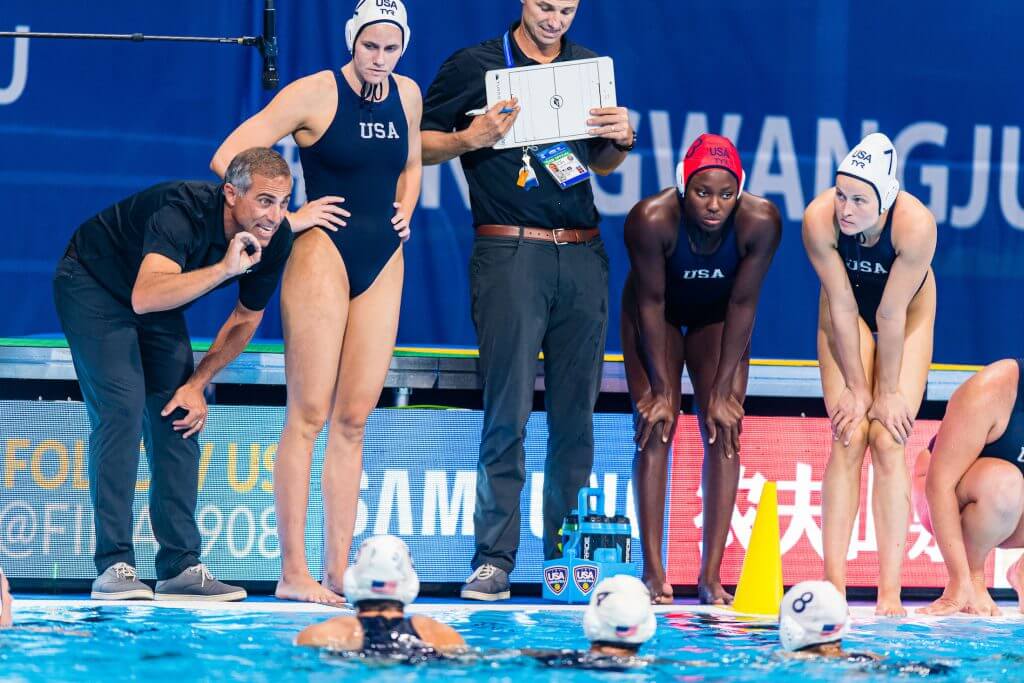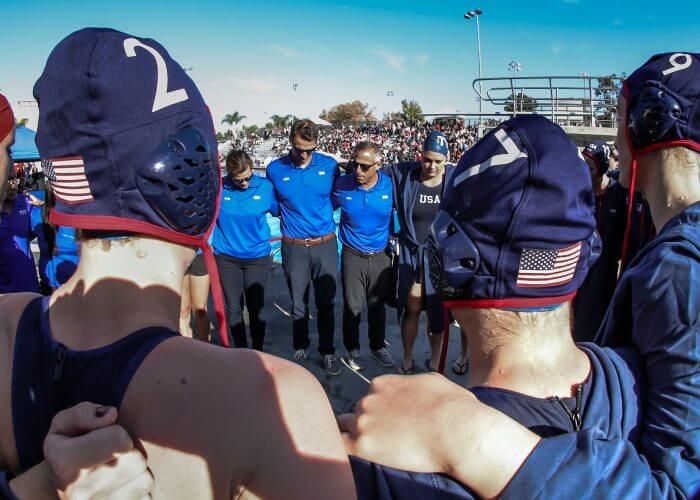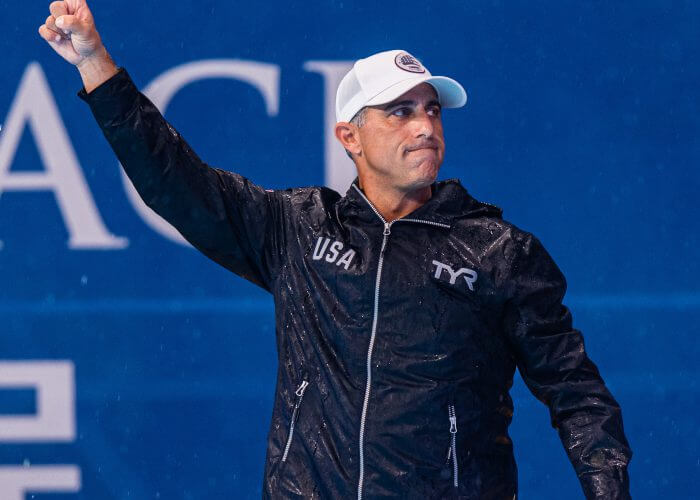Adam Krikorian, USA Women’s Water Polo Coach, On Tokyo Olympics Postponement

These are unprecedented times, and the announcement earlier today by Thomas Bach, president of the International Olympic Committee (IOC), to postpone the Tokyo Games has addressed uncertainty caused by the global coronovirus pandemic. But, for teams like the U.S. Senior Women’s national water polo team, delaying the Olympics an extra year has raised many new questions.
[It’s Tokyo 2021 Olympic Games, IOC & Japanese Prime Minister Confirm]
In an exclusive interview, Adam Krikorian, who will begin his 12th year as the head coach for the American women on March 27, agreed that Bach’s and the IOC’s actions are justified. But he explains that the underlying causes of this unique moment—specifically the burden borne globally due to the ravages of COVID-19—reverberate far beyond the sporting world.
– Do you think postponement was the right decision?
I think it was. It was the only decision. The IOC and their organizing committee—people have taken some shots from them recently—unfairly in my opinion. This is one of the biggest events in the world, and there’s so many details involved that it was just a matter of time before they came to this conclusion.
I’m certainly glad they did—and I’m certainly appreciative of their flexibility. This is unprecedented.
– There have been three cancellations due to world wars but there’s never been a postponement.
In reading Thomas Bach’s statement, you can clearly tell that cancellation was not an option for him. Although this could affect many athlete’s ability to make a team or to qualify for the 2021 Olympic Games, at least it’s still giving everyone an opportunity to take part.
– You were in the home stretch for Olympic preparation, How will your delay change your planning and expectations for the U.S. women’s national team?
All they have said is that it’s 2021—and not past the summer of 2021. It’s going to be tough to formulate a plan until we know the exact dates. Our planning is extensive and specific. At this moment, we’re obviously going to have to push the start again button.
But, it’s tough to put plans into place without knowing the end date.
– The 2020 Olympics were going to bring substantial change to water polo. How does the delay impact those proposed changes?
Maybe this is a bit naïve but I don’t think this affects our sport at all—the progress we’ve made. It just gives us another year to sort through some things and [become] clearer in the way the game is going to move forward—in regard to the number of athletes as well as how the game is being officiated.

Photo Courtesy: Catharyn Hayne
– In your experience is there anything at all the parallels this?
No, this is unique. I can’t personally compare it — but the one thing that’s stood in my mind the whole time is the 1980 Olympic team—coaches and teams that weren’t able to participate. I feel for them to this day.
We’re all getting again this unique opportunity to still compete—it’s just a year later.
You’re taught as an athlete, and certainly as a coach, we emphasize that you’re taught to be flexible. Adaptable. To change with the times. In order to be one of the best athletes in the world, you have to. You’ve got to adapt in the middle of a game, in the middle of a tournament.
These athletes and these teams are incredibly resilient. It’s one of the greatest characteristics of many of them. For that reason, I don’t believe this is going to be too much of a struggle for them.
– What does this mean to you, your staff and—most of all—to your players?
Honestly it seems inappropriate and awkward to even speak about the difficulty for us. We’re in a time right now when the world is suffering. There are people who are going through unimaginable things. Doctors and service people who are on the front lines, dealing with this pandemic on a daily basis.
For us to say our lives are turned upside down, or: “These times have been so challenging for us,” to me is completely ignorant. And shows a lack of awareness.
Our focus, and our attention right now isn’t on sport, it is on the 2021 Games. It’s on doing what’s best for humanity, what’s best for our communities.
That’s quite simple right now. It’s: Stay home. Take care of your loved ones.
– Given the impact of the coronavirus crisis, to what extent are your in touch with your athletes?
One of the wonderful things about technology, every day we have some type of meeting via Zoom. Whether it’s a meeting with our sports psychologist or to watch video, we’ve been able to stay in touch.
We’ll continue to stay in touch and share thoughts and emotions. I’m sure our next discussion will bring all sorts of emotions now with this new news.
The difficult thing is, we just don’t know how long this thing will last. There’s no date for the 2021 Olympics and—more importantly—there’s no end date for this pandemic.
These athletes are used to so much detail and so much structure—and some certainty with regard to that schedule. We will just need to get comfortable being in this uncertainty and stay in touch.
Again, it’s really difficult to put a plan in place when we don’t know the end dates and when we don’t know what’s best from a medical stand point.
We’ll continue to do what we’ve done, which is to rely on the medical professionals to help us make educated decisions going forward,
– As a practical matter, you don’t really know when you’ll be able to train together as a group.
I really have no idea. It’s easy to get up in speculation and guess, but it really just spins us in circles. you don’t make any progress.

Photo Courtesy: Orange Pictures
We just take it day-by-day and focus on what we can do—and obviously being safe. There’s some things I’ll do and that our athletes can do at home in terms of strength training and developing other skills through watching video. Or just enjoying some time with family and loved ones. Too often these days we’re too busy running around… if there’s any positive to this it’s slowed us all down and it’s made us appreciate those that we’re close to.
– When was the last time you were home and around family this much?
Never. Never. That’s been an adjustment, but it’s been a nice adjustment. There are positives to this—for me from a selfish standpoint. Every evening I’m spending time helping my wife cook or eating family dinner. We eat family breakfast. We go on walks together as a family.
I’m getting to spend time, helping them with homework and school work and just getting things organized around the house.
As difficult as this time has been for so many around the world it’s also been a nice time for some of us lucky ones to be able to reconnect with our families.
– Have your players stayed in the area or gone back to their families?
Those have stayed in the area who have places in Long Beach; those whose families are far away that require flights, [they] are still in Long Beach or Seal Beach or around the area. There are certainly those who live close by who’ve gone home.
Some are going back and forth a bit. One of the most difficult things for our team is they haven’t been able to see each other. you can do all you want on platforms like Zoom, but those daily interactions are truly what makes this journey so special. To not be able to have those, and to laugh—even to suffer at times—is something they all miss very much.
– What sort of silver lining can you foresee from this situation?
Two words come to mind: humility and perspective. I can’t help but to think this is a great lesson for all of us, that you enjoy the precious moments that we have. Sport, as much as we love it, and as much of a passion it is for us, it’s still just sport. It doesn’t last forever and it can be taken away from us at any moment.
Hopefully that perspective and humility will help us all so we become better athletes or better coaches moving forward or—more importantly—just better people.



